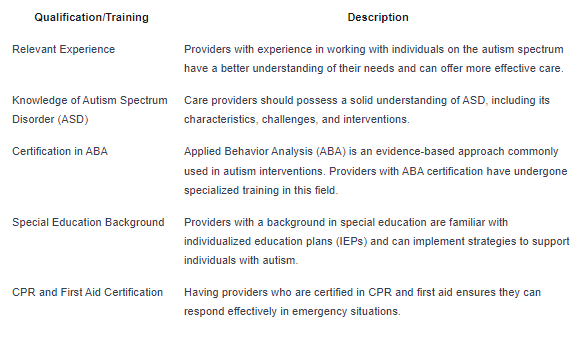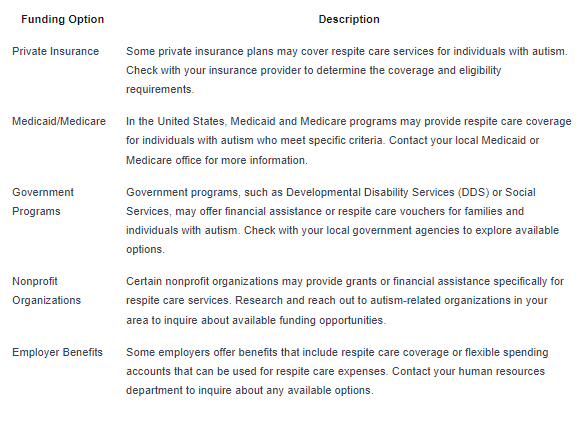Benefits Respite Care for Autism
Discover the remarkable benefits of respite care for autism. Support, relief, and independence for individuals and caregivers.

Understanding Respite Care for Autism
Respite care is an invaluable service that provides temporary relief and support to individuals with autism and their caregivers. This section will explore what respite care entails and how it supports individuals with autism.
What is Respite Care?
Respite care refers to the provision of temporary care and supervision for individuals with autism, allowing their primary caregivers to take a break from their caregiving responsibilities. It offers a period of rest and rejuvenation for caregivers, while ensuring that individuals with autism receive the care they need in a safe and nurturing environment.
Respite care can be provided in various settings, such as in-home care, community-based programs, or specialized facilities. The duration of respite care can range from a few hours to several days, depending on the needs and preferences of the family.
How Respite Care Supports Individuals with Autism
Respite care plays a crucial role in supporting individuals with autism by addressing their unique needs and promoting their well-being. Here are some ways in which respite care supports individuals with autism:
- Structure and Routine: Respite care providers understand the importance of routine and structure for individuals with autism. They create a safe and familiar environment, ensuring consistency in daily activities and helping individuals feel secure and comfortable.
- Social Interaction: Respite care offers opportunities for individuals with autism to engage in social interactions with trained professionals and peers. Through structured activities and play, individuals can develop and enhance their social skills, communication abilities, and emotional connections.
- Skill Development: Respite care programs often incorporate structured learning activities that focus on developing essential life skills for individuals with autism. These can include self-care skills, decision-making abilities, and independent living skills, empowering individuals to become more self-reliant and confident.
- Emotional Support: Respite care providers are trained to understand and address the emotional needs of individuals with autism. They provide a supportive and nurturing environment, offering emotional reassurance and guidance to help individuals navigate their feelings and cope with challenges.
By offering a supportive and structured environment, respite care enables individuals with autism to thrive and reach their full potential. It also provides caregivers with the much-needed time and support to recharge, reducing the stress and burnout often associated with long-term caregiving responsibilities.
Understanding the benefits of respite care for individuals with autism is crucial in promoting their overall well-being and ensuring that they receive the care and support they need.
Benefits of Respite Care for Individuals with Autism
Respite care provides numerous benefits for individuals with autism, offering support and relief to both the individuals and their caregivers. Let's explore some of the remarkable advantages of respite care in the context of autism.
Providing Relief to Caregivers
One of the key benefits of respite care for individuals with autism is the much-needed relief it offers to caregivers. Caring for a loved one with autism can be physically and emotionally demanding, often requiring round-the-clock attention. Respite care allows caregivers to take a break, recharge, and attend to their own well-being. By providing temporary relief, respite care helps prevent caregiver burnout and promotes a healthier caregiving environment.
Enhancing Social Interaction
Respite care also plays a crucial role in enhancing social interaction for individuals with autism. Trained respite care providers facilitate opportunities for individuals to engage in social activities, interact with others, and develop important social skills. This social interaction can contribute to improved communication, socialization, and overall well-being for individuals with autism. By participating in structured activities and being in the company of others, individuals with autism can grow their social confidence and build meaningful connections.
Promoting Independence
Respite care promotes independence by offering individuals with autism the opportunity to engage in activities tailored to their abilities and interests. Respite care providers work closely with individuals to encourage and support their independence in daily tasks, such as self-care, household chores, and recreational activities. By fostering independence, respite care empowers individuals with autism to develop essential life skills, gain confidence, and increase their autonomy.
The benefits of respite care extend beyond the individuals with autism themselves, positively impacting their caregivers and overall family dynamics. By providing relief, enhancing social interaction, and promoting independence, respite care plays a vital role in supporting the well-being of individuals with autism and their families.
Importance of Routine and Structure
When it comes to providing care for individuals with autism, routine and structure play a vital role in promoting their well-being and overall development. Let's explore the importance of routine and structure in the context of respite care for autism.
Creating a Safe and Familiar Environment
Individuals with autism often thrive in environments that are predictable and familiar. Respite care providers understand the significance of creating a safe and consistent space for individuals with autism. By maintaining a structured routine, they can help create an environment that feels secure and familiar, which can alleviate anxiety and promote a sense of stability.
Respite care providers work closely with caregivers and families to understand the specific needs and preferences of individuals with autism. This collaboration allows them to establish routines that align with the individual's daily schedule and activities. Whether it's meal times, playtime, or rest periods, adhering to a structured routine helps individuals with autism feel more comfortable and secure in their surroundings.
Consistency in Care
Consistency in care is essential for individuals with autism. They often rely on predictability and repetition to navigate their daily lives. Respite care providers recognize the importance of maintaining consistent care practices and approaches.
By adhering to consistent strategies and techniques, respite care providers can effectively support individuals with autism. Consistency ensures that individuals receive the same level of care and support across different respite care sessions, which can contribute to their overall well-being. It helps individuals with autism understand what to expect and minimizes any confusion or anxiety that may arise from changes in routine or care providers.
To maintain consistency, respite care providers work closely with caregivers and families to understand the individual's specific needs, preferences, and goals. This collaborative approach allows for the creation of personalized care plans that can be consistently implemented, ensuring continuity in care.
By prioritizing routine and structure in respite care for individuals with autism, caregivers and respite care providers can create an environment that promotes stability, comfort, and growth. The consistent and familiar routines established through respite care can provide individuals with autism a sense of security and support their overall well-being.
Tailoring Respite Care for Autism
To ensure the effectiveness of respite care for individuals with autism, it is essential to tailor the care provided to meet their unique needs. This involves developing individualized care plans and providing specialized support and training.
Individualized Care Plans
Every individual with autism has different strengths, challenges, and preferences. Therefore, it is crucial to create individualized care plans that take into account their specific requirements. These care plans outline the goals, strategies, and interventions necessary to support the individual's well-being during respite care.
An individualized care plan for autism may include:
- Personalized goals: Setting specific and measurable goals that target areas such as communication, social skills, behavior management, or daily living skills.
- Structured routines: Establishing consistent schedules and routines that provide predictability and reduce anxiety.
- Sensory considerations: Identifying sensory sensitivities or preferences and implementing strategies to create a sensory-friendly environment.
- Communication strategies: Utilizing alternative or augmentative communication methods, such as visual supports or assistive technology, to enhance communication and understanding.
- Behavioral supports: Implementing strategies to manage challenging behaviors and promote positive behaviors, such as using visual schedules or reinforcement systems.
By tailoring respite care through individualized care plans, caregivers and care providers can effectively address the unique needs of individuals with autism and provide the support required for their well-being.
Specialized Support and Training
Respite care providers for individuals with autism should possess specialized knowledge and training to effectively support their unique needs. This may include specific training in autism spectrum disorders, behavior management techniques, communication strategies, and sensory integration.
Specialized support and training for respite care providers may involve:
- Understanding autism: Gaining knowledge about the characteristics, strengths, and challenges associated with autism spectrum disorders.
- Behavior management: Learning evidence-based strategies for addressing challenging behaviors and promoting positive behavior patterns.
- Communication techniques: Acquiring skills in using visual supports, social stories, or other communication tools to enhance understanding and expression.
- Sensory integration: Developing an understanding of sensory sensitivities and strategies to create a sensory-friendly environment.
- Safety and emergency procedures: Being trained in responding to emergencies and ensuring the safety of individuals with autism.
By ensuring that respite care providers have the necessary specialized support and training, individuals with autism can receive the appropriate care and support they require during respite care periods.
Tailoring respite care for autism through individualized care plans and specialized support and training helps to create a supportive and nurturing environment for individuals with autism. This personalized approach enhances the effectiveness of respite care and contributes to the overall well-being of individuals and their families.
Ensuring Quality Respite Care
To ensure that individuals with autism receive the best possible care, it is crucial to prioritize the quality of respite care services. This involves considering the qualifications and training of care providers, as well as fostering effective communication and collaboration with caregivers.
Qualifications and Training of Care Providers
When seeking respite care for individuals with autism, it is important to choose care providers who have the qualifications and training necessary to meet the unique needs of those on the autism spectrum. Look for providers who have experience and knowledge in working with individuals with autism, as well as relevant certifications or degrees in fields such as special education, psychology, or applied behavior analysis (ABA).
Here are some qualifications and training considerations to look for in care providers:

Communication and Collaboration with Caregivers
Effective communication and collaboration between care providers and caregivers are essential for ensuring the continuity of care and the well-being of individuals with autism. Open lines of communication help caregivers stay informed about their loved one's progress, any challenges faced, and strategies that have proven successful.
Here are some key aspects of communication and collaboration to consider:
- Regular Updates: Care providers should provide regular updates to caregivers, sharing information about the individual's experiences, achievements, and any concerns that arise during respite care sessions.
- Caregiver Input: Caregivers should have the opportunity to provide input regarding the individual's needs, preferences, and goals. Their insights can help shape the care plan and ensure it aligns with the individual's overall well-being.
- Sharing Strategies: Care providers can share effective strategies and techniques with caregivers, empowering them to implement these strategies at home and in other settings. This collaboration promotes consistency and reinforces learning.
- Progress Reports: Care providers should provide written progress reports to caregivers, summarizing the individual's progress, areas of improvement, and recommendations for ongoing support.
- Feedback Mechanisms: Establishing mechanisms for caregivers to provide feedback about the respite care services can help identify areas for improvement and ensure the care provided is meeting the individual's needs.
By ensuring that care providers have the necessary qualifications and training and fostering effective communication and collaboration with caregivers, the quality of respite care for individuals with autism can be enhanced. This holistic approach supports the well-being and development of individuals on the autism spectrum.
Financial Considerations and Resources
When it comes to respite care for individuals with autism, financial considerations play a significant role. Understanding the funding options available and accessing community support and programs is essential to ensure that individuals with autism can benefit from respite care when needed.
Funding Options for Respite Care
Finding the necessary funding for respite care can sometimes be a challenge, but there are various options available to help offset the costs. These funding options can vary depending on the country or region, so it's important to explore the options specific to your location. Here are some common funding options for respite care:

It's important to note that the availability and eligibility requirements for these funding options may vary depending on your location and individual circumstances. Researching and exploring these options can help alleviate financial burdens and make respite care more accessible for individuals with autism and their families.
Community Support and Programs
In addition to funding options, community support and programs can be valuable resources for accessing respite care for individuals with autism. These community-based initiatives aim to provide support and assistance to families and individuals in need. Here are some examples of community support and programs:

By tapping into community support and programs, individuals with autism and their families can find additional resources and assistance for accessing respite care. These initiatives can be invaluable in providing the necessary support and relief to caregivers while ensuring the well-being and quality of life for individuals with autism.
Sources
https://behavioral-innovations.com/blog/respite-care-benefits-caregivers-of-individuals-with-autism/
https://www.astraaba.com/blog/respite-care-for-autism
Similar articles
We’re here to help you

Our team is here to assist you in this process. Contact us for any assistance.
it’s easy to apply
We Accept Most Insurances
Our in-network insurance partnerships make ABA therapy more accessible to families throughout our service areas.







Our Insurance Process
We'll request your insurance details to help us verify your plan's coverage for ABA therapy. Once we've received this information, we'll walk you through your benefits, including copayments, deductibles and out-of-pocket maximums, so you know what to expect in advance.
Our team will then handle the preauthorization and all the necessary paperwork.
.svg)





















.jpeg)


































.jpeg)




.jpeg)







.jpeg)











.jpeg)
















